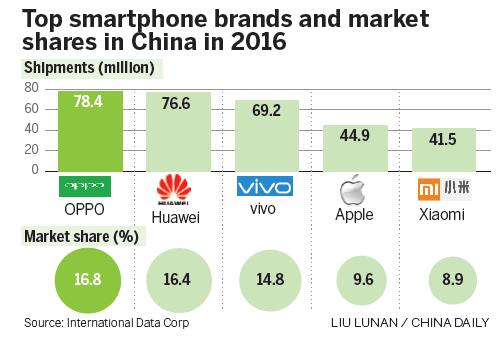
Chinese smartphone brands Oppo and Huawei are tightening their grip on the world's biggest market, grabbing local share and squeezing out Apple Inc and Samsung Electronics Co.
After including vivo Mobile Communication Technology Co, Chinese vendors held the top three slots and accounted for 48 percent of shipments in the country during 2016, research firm International Data Corp said.
With a lineup of flexible and curved-screen devices, they look set to dominate the market in 2017. A decline in Apple shipments in the fourth quarter highlighted how the iPhone 7 failed to make as big a splash in the face of escalating competition.
Apple and Samsung have steadily ceded ground in China to aggressive local manufacturers since Xiaomi Corp came on the scene around 2011. Xiaomi itself was ranked fifth in 2016, as Oppo Electronics Corp, Huawei Technologies Co and vivo phones were the top three sellers, accounting for 48 percent of shipments last year and relegating the US company to fourth spot, IDC said in a report released on Monday.
"Even though the new black-colored iPhones caught the attention of consumers, overall, the new launches did not create as much of a frenzy compared to the past," IDC said in its report.
Chinese vendors are marketing higher-end devices that appeal to consumers seeking Apple-like quality and innovation. IPhone shipments dropped 23.2 percent in 2016, shrinking Apple's market share to just 9.6 percent-the lowest in about two years. Samsung didn't even figure in the top five.
China had for years driven Apple's spectacular growth even as smartphone demand faltered elsewhere. But the country's slowing economic growth and the ascendancy of cheaper but just-as-good local alternatives has taken its toll.
Apple may regain ground with the next iPhone later this year, the 10th anniversary of the device that ushered in the modern smartphone industry. Apple is expected to showcase the best features it can bring to bear in an increasingly commoditized market.
"Apple's 10-year anniversary iPhone will also likely attract some of the high-end Android users in China to convert to an iPhone," IDC said.


















































